#chaos gremlin eliot
Text
at first you’d think eliot is gruff and manly and just a punchy-man, but he literally also lives to cause subtle chaos
this man says the most unnerving things to a mark for shits and giggles
this man literally took a bite out of a live snake to commit to the act
we need to embrace chaos gremlin eliot more
#yes we know parker is one and so is hardison#but have you considered: ELIOT THOUGH#chaos gremlin eliot#leverage redemption#leverage#the boiler room job#i think#i forget the redemption ep I’m referencing#the one about the dog dying and making peace with it#eliot I want to study you like a bug#eliot spencer#eliot spencer meta#meta#mine#leverage: let’s go steal a queue#popular posts#1k#chaos gremlin eliot spencer
2K notes
·
View notes
Text
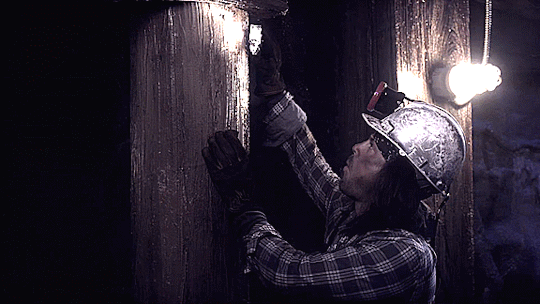
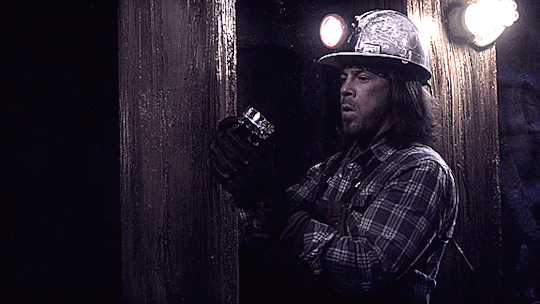
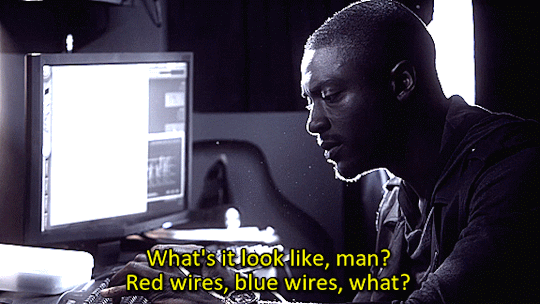
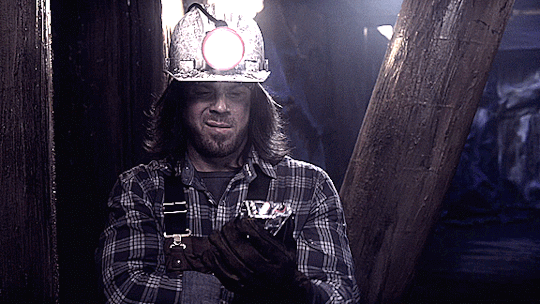

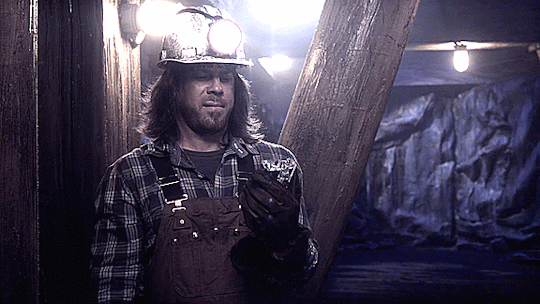
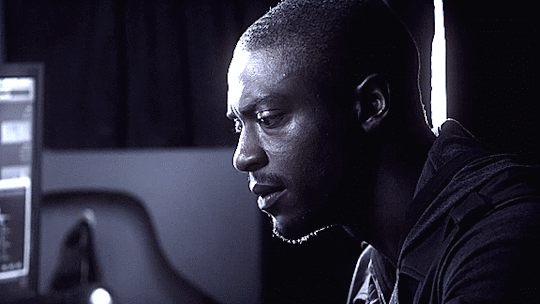
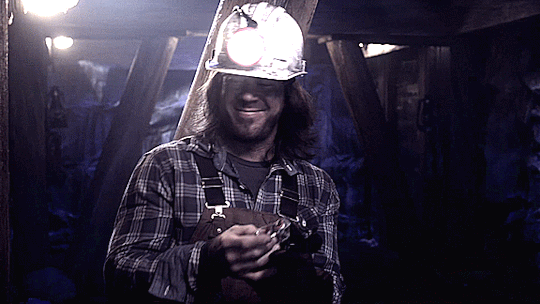
Eliot doing what Eliot does best - tormenting Hardison!
Leverage S03E10 The Underground Job.
#leverage#eliot spencer#alec hardison#christian kane#aldis hodge#eliot can be such a little shit sometimes#a chaos gremlin#but i'm sure hardison got his revenge later on!#ghostly'sgifs
379 notes
·
View notes
Text
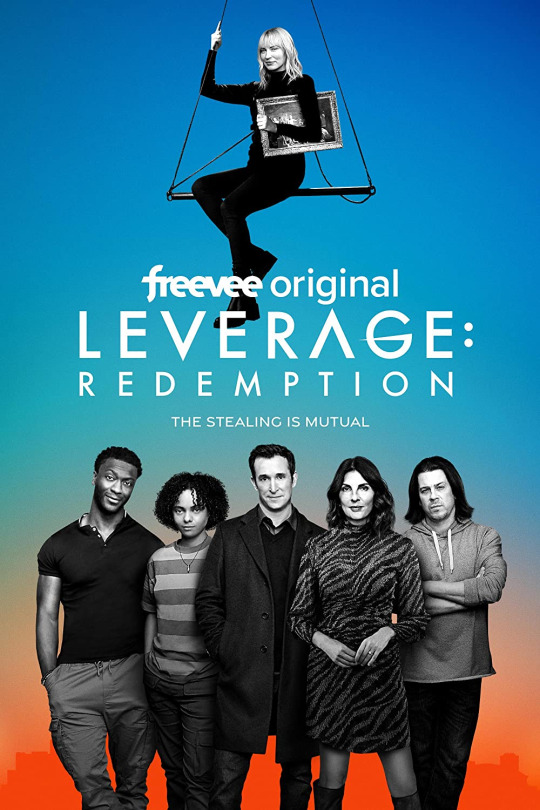

I have finally caught up with the reboot after finishing the original series, and I believe everyone fed up with the world right now should watch them. Witnessing billionaires get simmered over a low flame, then torn to shreds and seasoned correctly does wonders for my blood pressure.
#Leverage (2008)#Leverage: Redemption#emotional support himbos your honor#the found family vibes are off the charts#queer platonic polycules#cannon ace lesbian niece-in-law that is also a hacker hellloooo#eat the rich#I prescribe this show for depression#2008 was about father figures#the reboot is about being the weird uncle who commits to the bit#femme fatales that are also chaos gremlins#it's about the orange soda and homoeroticism#if season 3 gets canceled I'm going to go feral#for the love of god let Eliot be happy#long tags because I am normal about this show
3 notes
·
View notes
Text
It’s time for shitposting friday!
Male love interests of my novels (WIPS and published ones), ranked in order of “Oh babygirl, there is something wrong with you”
7. Heka “Deer Knight” (Married to the Evil Wizard King) : Actually doing pretty well? Is a construct created like two months ago, didn’t have time to pick up a lot of trauma yet. The most stable guy in the lineup, an absolute pillar of mental health and zen. 1/10
6. Caspian Sterlet (Space Academia) : LMAO. Lol. Messed up but in a “the author thinks this is funny” sort of way. 2/10 absolute white man failing up mediocrity and the best part is that he’s aware of it.
5. Adrien (Skin Deep) : You guys watched Leverage? He’s like Eliot Spencer level of fucked up, but like pretty stable on average. 4/10 traumatized but he’s acting normal about it.
4. Lie Ingelf (Crimson Vines) : oooooh baby. Now here’s some crunchy trauma, but compared to some others on this list he’s handling it fine. 5/10 He and Adrien are having a beer and absolutely not talking about it
3. Zeta Greenshank (Space Academia) : Oh babygirl there is something wrong with you! (Affectionate) (Compliment). Not in terms of trauma but in terms of he thinks he’s the main character of the x-files and he refuses to be normal about it. Daniel Jackson pre-SG1 core. Absolute chaos gremlin man 10/10 funniest dude at the party
2. Eltanin “Evil Wizard King” Darkmore (Married to the Evil Wizard King) : whoops fucked up backstory and 1000 years of self-imposed solitude to escape a curse go brrrr. Has feelings and doesn’t know what to do about it. 10/10 would bully again.
1. Archibald “Jim” Montgomery (Four Liars in space) : Absolute poor little meow meow, incredibly fucked up, trauma up the wazoo and he’s NOT dealing with it, was once described as “now there was a man that needed to be buckled into a harness and told what to do for an hour or so. He looked like he desperately yearned to escape the pressure of inhabiting his own brain.” 11/10 no notes
#my writing#shitposting#lmao I make myself laugh that’s the important part#can I write a normal guy as a love interest? 🤔#well I guess that’s what Caspian is and I endlessly make fun of him for it#four liars in space#skin deep#married to the evil wizard king#crimson vines#space academia
9 notes
·
View notes
Text
getting back into the SU fandom made me remember me and my friend's hilarious team of gem OCs from like 8th or 9th grade
they were called the stardust gems, they lived on earth and the only reason they didn't get monster-ified was cuz they all coincidentally happened to be off planet at the time. they've been on earth for thousands of years. the crystal gems know they're there and are loyal to earth and they technically could've asked them for help any episode. the only reason they never asked is cuz the stardusts were just so comically shitty at their jobs. they lived in ocean town and didn't have a cool temple, just an absolute mess of a house that had to have the fire department called at least monthly.
#eliot posts#su#sometimes ur old ocs... are good#the gen that i in particular made was named opalite#there was also amber and aqua aura quartz and flane aura quartz#thise 3 were more his but we kinda shared all the chars#opalite was a semi failed experiment by homeworld to make synthetic gems with little to no resources#due to this her physical form was super unstable#limbs would often just fall off or melt of fracture like porcelain#she escaped homeworld by shapeshifting wings and flying away for many years and ended up on earth#she really loved humans and wanted to befeiend them but looked kinda objectively horrifying and didnt understand social rules at all#she ended up befriending some half blind old folks at the nursing home tho#im still proud of her character design after all these years tbh#she looks v aesthetically pleasing tbh#worked better w my old art style than current one tho#amber was opalite's gf#she was sent on a wild goose chase to catch opalite and bring her back to the lab to be studied#after so many centuries of this they kinda just. ended up falling in love#amber was an absolute chaos gremlin and loved causing bee related shenanigans#aqua and flame aura were slightly less developed but still cool#team stardust had 1 collective brain cell and aqua and flame played hot potato with it. amber and opalite never got custody.#also too bad i dont have my old sketchbooks here in my dorm#i had some rlly cute art of them#this was BEFORE lapis and peridot and the barn btw#i guess the concept of 'there are these losers who just chill and make bad art and dont help that much' is just so good#tho lapis and peridot did end up being helpful#i like to believe the stardusts are still out there causing shenanigans#*the whole spinel thing happens* flame: amber what the FUCK did you do? amber: wasnt me this time. i SWEAR. opalite can vouch for me.#tbh amber would seem like a pretty solid peridot knockoff if she was created today. but no she was just coincidentally Like That#peridot miiight have made a brief appearance by that time? but def didnt get redeemed and go full gremlin yet
11 notes
·
View notes
Text
the sterling-nate-sophie "old school, chess playing, classy" crime dynamic vs the eliot-hardison-parker "chaos gremlins" crime dynamic is incredibly satisfying to see play off each other, play together, and kind of inform and influence each other over the seasons
6 notes
·
View notes
Text
WELCOME TO MY PROFILE!!!
┏━ •◦இ•◦ ━┓
┊ ┊ ┊ ┊ ┊ ┊
┊ ┊ ┊ ┊ ˚✩ ⋆。˚ ✩
┊ ┊ ┊ ✫
┊ ┊ ☪︎⋆
┊ ⊹ ┊
✯ ⋆ ┊ . ˚
˚✩
⊰᯽⊱┈──╌❊╌──┈⊰᯽⊱
hello, I am the gremlin of this account. I mainly post artwork of my main OCs ((Anna and Eliot))
The two mean the world to me. It'd be appreciated it y'all didn't repost my drawings of them, tbh, it makes me low-key uncomfortable.
but! with that aside, let's talk about the admin for a moment!
Call me Casper, I am a 19 year old. And I'm female (she/her)
I'm always tired and like to annoy the hell out of my brother. I'm very smol (5ft) and my family likes to poke fun with that. I'm overall a pretty chill person, I got the "I don't care" type of mood 24/7
anyway
OCs that I most likely gonna be drawing and posting on this account
Annabelle Harper
Eliot Harper
these two, like I said, mean the world to me. They are beings from another dimension. This dimension is know as Euphasia (You-fae-shuh) and it has these demon like creature. No, they're not demons they are a species that I made a little while ago called Euphs. (you-fs) I will be explaining more (hopefully) in the near future.
Annabelle is the more chaotic one while Eliot is just the lazy one. They're considered Irish twins since they were born on different month's
Isadora Lance
she's a lil ghost girl, she was previously supposed to be this voice that people head and had the ability to mimic someone else's voice, but I scrapped that idea a while back, so now she's a ghost!!
Halo
Halo is a demon Queen that I made, very rude at times. Uh, I have really thought into who she is and whatnot
Jessie Quinzel
She is my DC OC. Being the daughter of Harley Quinn (the last name is obvious) and Joker. She's a somewhat chaotic, carefree individual. She has two other siblings, Seth and Stacy Quinzel. Actually, she use to be my old Creepypasta OC. Now she's my DC OC
Blake Wilson
Blake is a wendigo, being about to shift to human form at will. He is destructive when he wants to be. He and Anna were together for a little while, but it didn't work out. He has an older sister named Hannah
Salah Marbus
Another being from Euphasia. Very little is known about her. She tends to keep herself isolated and to herself in general. Her species is known as an Alph. She has no other family, unfortunately.
Dhara Crypta
Dhara, also known as Dee, is a hunter/warrior like individual. She, herself, is also an Alph, like Sal. She is most known by the King and Qween of Euphasia, standing by their side when necessary.
Clara Wilson
No, she is not related to Blake, for starters. Clara is, YET ANOTHER, being from Euphasia. She is one of the more dangerous ones. She is one with The Dark Ones. The Dark Ones are these shadowy-like figures. They only come out at night.
Orchid Arwen
She is the only one of her species, a Whispering Fairy. Like Sal, not much is known about her. She hides herself from civilization on most days.
Jason Wellerman
One of the most chaotic demons in all of Hell. He an honoree individual, very very rude at all times. He has three other siblings, a twin sister, Luna, an older sister, Abby, and and older brother, David.
Wysteria Flynn
Fairy baby, fairy baby!! Wysteria is a fairy. A nice fairy. She's best friends with Anna. She has green cat like eyes and short brown hair. She has no other siblings
Lorelei Winston
Corelei Winston
These two are identical twins. They were both born with supernatural abilities. Four abilities each.
Lorelei's abilities
Sonic screech
Levitation
Bilocation - being in multiple places at once
Telepathy
Corelei's abilities
Channeling - being able to communicate with a spirit
Telekinesis
Ability to see through someone else’s eyes
(Basically she see what someone else is seeing, only she’s looking that person’s eyes-)
Super strength
Mariana
She is my Siren OC. Nothing much about her, she has the ability to shift to a human form when she's out of the water.
Lana Wine
Lana is a solo gangster. She ran away from home at the age of 13. Marco, a leader of a gang (which has no name yet) took her in, so Lana would have a roof over her head. She soon left said gang and now running a solo gangster life. She has an older brother (unnamed at the moment) and a younger sister (unnamed at the moment)
Lucia Roslyn
Lucia is another demon OC. She previously was supposed to be the devil, but I decided to scrap that idea as well. She's tall. Lucia has a younger sister, Elana and an older brother, Lex.
Cynthia Martins
I'm not for sure if I wanna make her my My Hero Academia OC or not. But she can shapeshift. I don't normally talk about her, so.
Matthew Mercer
Matt is just another hooman OC. Not a whole lot about him. He loves video games and causing chaos with Anna
Odyssey Celeste
Odyssey is a light-bringer. Basically she has the power of light. She brings light to the darkest places. A light-bringer is another being from Euphasia.
⊰᯽⊱┈──╌❊╌──┈⊰᯽⊱
OK!! Now that I have all my OCs out of the way, most of you may be wondering.
Dear Gremlin, what is the magical fantasy land known as Euphasia? Well Euphasia is a land, mostly consisting of floating islands. It's broken up into multiple territories. The Euphs have their own territory while the Alphs have their own territory. And the Light-bringer travel from territory to territory along with The Dark Ones.
There are four guardians, elemental guardians. The Air, Fire, Earth, and Water guardians. There is also a goddess like being who is most commonly known as Ivolyn. (eye-vo-lynn)
I haven't actually looked all into the Guardians that much, so when I do so, I will immediately be putting it in the pinned post!!
⊰᯽⊱┈──╌❊╌──┈⊰᯽⊱
Now, I think that's all out of the way. Time for socials!
Instagram
Main account: @/cotton_candy_dreams12
Art account: @/the_doodle321
Discord
Main and only Discord: @/GremlinBaby#6366
Snapchat
pandachild20
Tik Tok
@/nutella_child101
Twitter
@/Color_Addict
YouTube
https://youtube.com/channel/UCh0-7hl7eQ-5ZySeavahnTw
⊰᯽⊱┈──╌❊╌──┈⊰᯽⊱
The type of artwork I'll be posting. It's going to be both traditional and digital artwork. I rarely draw digitally, and I usually sketch when i comes to traditional artwork.
I try to use watercolors
I use alcohol markers to fill in for color or I just keep the linework and call it good.
Some of my illustrations may or may not have some bits of gore, considering that most of my characters are..gorey in a way.
I draw mostly OC art
Very rarely will I draw a canon character from any show, novel, etc.
⊰᯽⊱┈──╌❊╌──┈⊰᯽⊱
Alright with that all out of the way, I think my pinned post is all done, I hope you enjoyed it and like I said, I hope you enjoy my artwork.
CREDIT
Aesthetic image: Made by me in PicsArt
Text Art: From Amino
╓┈♔◦☓◦☙◦♔◦☙◦☓◦♔┈╖
Now I think that's all, I hope you enjoyed yourself and have a nice day!!
╙┈♔◦☓◦☙◦♔◦☙◦☓◦♔┈╜

#pinned post#about the admins#talking about OCs#aesthetic#meet the admin#art talks#fantasy world#admin
2 notes
·
View notes
Text
Making of, 1

’Doppelganger’ (‘Dopperugengâ'), Kiyoshi Kurosawa, 2003, VO, SE en YouTube.
youtube
'El hobbit: Un viaje inesperado' ('The hobbit: An unexpected journey'), Peter Jackson, 2012, VE.
youtube
'El hobbit: La desolación de Smaug' ('The hobbit: The desolation of Smaug'), Peter Jackson, 2013. Vídeo blog, VOSE.
‘American graffiti’ (íd) George Lucas, 1973, VO, SE en YouTube.
youtube
'Lo que la verdad esconde’ ('What lies beneath’), Robert Zemeckis, 2000. ‘Construyendo un thriller perfecto: Lo que la verdad esconde’, VOSE.
'The making of Wilder and Brackett's Sunset Boulevard: Forum at SFU', VO, SE en YouTube.
youtube
0 notes
Text
The rise of (societal) resilience tech
If you follow millennials on Twitter (and god help you), then you know that Anne Helen Petersen’s piece this past weekend “How Millennials Became The Burnout Generation” struck a deep chord for many.
It’s longform and detailed, but Petersen’s primary thesis is that my generation has been dumped into one of the worst moments for economic and social mobility in recent memory (global financial crisis, etc.), which has led us to massively over-optimize our lives to try to extract any value we can. Baby boomers could work at a big company for thirty years at 40-50 hours a week with stable and increasing pay (with pensions!), while millennials have to simultaneously hold down four gigs and make their Instagrams and LinkedIns look great lest they fail to land their next gig, all while operating under the pressure of horrific levels of student loans.
Nod or shake your head, but I also think Petersen is getting at a much tougher challenge for society, one that I think will be one of the richest areas for investment in the coming years for founders and venture capitalists.
That thesis is around wellness and resilience, but not just of the health/physical variety. It also encompasses the reliability of our products, the level of income we receive each week, whether a storm might knock out our power, and how we read the news. Modern life is complicated and also chaotic, jumping from crisis to crisis we can barely understand. The question then becomes whether there are solutions that can absorb some of that complexity and chaos to simplify and satisfy our lives.
This week, rivers of glistening ink flowed over Lambda School, a Y Combinator alum that is using income share agreements to fund tuition at its schools. ISAs as a financial model are reasonably simple: if you go to a school, you agree to repay that school a fixed percentage of your income over a set period of time (let’s say purely for ease 10% of income for 10 years). Lambda School argues that this provides incentive alignment, because the school wants its graduates to be as successful as possible, while the Twitterati snarks that the startup has invented “taxes.”
First, fuck the snarkers who don’t spend any time learning about new, innovative models for offering services.
That aside, Lambda School is really offering a pathway to a more resilient life. If the economy collapses, student debt today still has to be paid on a fixed schedule, regardless of employment opportunities. Yet Lambda’s take ebbs and flows with the changes in the macroeconomy, offering to absorb the complexity and chaos around us. Want to take a year away from a high-paying job to work at a non-profit? You can, and Lambda adjusts without you even having to make a phone call.
This resilience tech isn’t limited to just education — it touches pretty much every facet of innovation. Just take a look at some startups I have profiled in the past year. Gremlin is using “chaos engineering” to reduce downtime and increase software reliability for web applications. Even is building out a savings model so that anyone can plan for financial independence. Wild Type is manufacturing salmon that can provide more sustainability to our environment and absorb climate change shocks.
There has been an enormous academic debate for more than two decades about the meaning of GDP, and whether there are alternative models worth exploring like Gross National Happiness. There are deep intricacies in that debate, but I would offer you this conclusion: we can wait for top-down permission to make a more resilient society, or we can create bottoms-up solutions that take some of the complexity and chaos out of modern life today. In a world of constant change and disruption, it’s the startups that increase stability that will reap rewards this decade.
TechCrunch is experimenting with new content forms. This is a rough draft of something new — provide your feedback directly to the author (Danny at [email protected]) if you like or hate something here.
What’s next & obsessions
After a bit of a hiatus from the holidays and avoiding CES, I am back. Arman and I are still exploring our obsessions from last year, including 5G deployments, China tech geopolitics, next-gen semiconductors, and GPS.
But the new direction we are going to spend some cycles on is this resiliency theme described above. How do we innovate for climate change? How do we handle the increasing complexity of modern life, whether it is educational/informational, financial, or health? What does water security mean, and how is the world going to adapt and innovate to ensure ten billion people have access to safe drinking water?
I love hearing from readers, so if you have thoughts, opinions, articles or books, share them with me: [email protected].
Stray Thoughts (aka, what I am reading)
The Planet Remade – Oliver Morton takes an imaginative look at geoengineering and its potential to solve climate change. Recommended to me by futurist writer (and reader) Eliot Peper.I read the first two chapters last night, and I enjoyed Morton’s framework around innovation and climate change. He poses two key questions: 1) should we take serious action on climate change, and 2) do you believe that taking action is very hard? He posits that if you are in the “yes/yes” camp, then today’s solutions offer nothing that will slow let alone reverse the effects of climate change. Therefore, it is incumbent on us to start exploring alternatives — i.e. geoengineering. I found the framework and his explanations lucid and compelling, and I’m looking forward to sharing more notes in the coming days/weeks.
The melting pot of JavaScript – I found this essay by well-known JavaScript engineer Dan Abramov quite compelling. He argues that the messiness of JS is a feature and not a bug, representing the flourishing of human creativity rather than a militarized top-down “BDFL” model that you see in other languages. That leads to complexity and “fatigue,” but also to much more rapid innovation. He has some suggestions on how to ameliorate that complexity’s worst effects, including improving default configurations to reduce cognitive load on engineers. Sounds like resiliency if you ask me.
On a more personal front, I wrote a long list of my personal favorite reads and writes of 2018.
Reading docket
What I’m reading (or at least, trying to read)
The Planet Remade by Oliver Morton and Networks of New York by Ingrid Burrington.
The rise of (societal) resilience tech published first on https://timloewe.tumblr.com/
0 notes
Text
eliot smiling as he presses the detonator for the fake bullets in the beantown bailout job and then laughing as he freaks out and ducks and covers rb if you agree
#someone make a gif of that he's so funny#he's genuinely having a good time your honor#i love the beantown bailout job because everyone is like NATEEEEE YOU BROKE US WE WANT TO HELP PEOPLE NOW#eliot was doing hinky things in pakistan but all he really wanted to do was have some fun hijinks with his (not) (totally) friends#he missed the chaos#chaos gremlin eliot#eliot spencer#the beantown bailout job#leverage season 2#mine#leverage rewatch#leverage: let’s go steal a queue
92 notes
·
View notes
Text

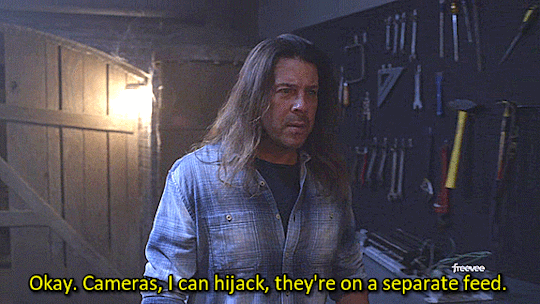
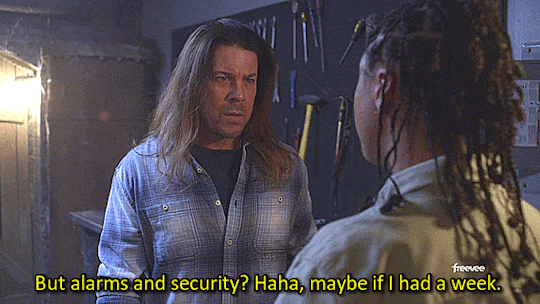
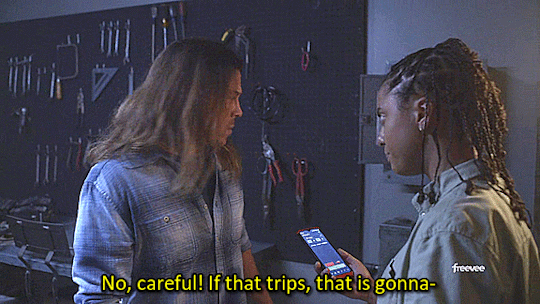
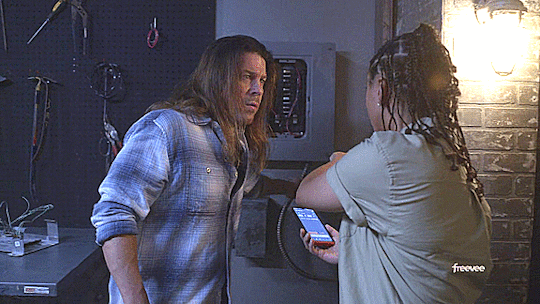


"They have some sort of pin lock on the security system. You know, I'm gonna have a word with this Interpol agent in charge."
Leverage Redemption S02E12 The Museum Makeover Job.
#leverage#leverage redemption#eliot spencer#breanna casey#christian kane#aleyse shannon#that eye contact before yanking the wires#eliot sir you are a chaos gremlin#tw flashing#ghostly'sgifs
52 notes
·
View notes
Text
The rise of (societal) resilience tech
If you follow millennials on Twitter (and god help you), then you know that Anne Helen Petersen’s piece this past weekend “How Millennials Became The Burnout Generation” struck a deep chord for many.
It’s longform and detailed, but Petersen’s primary thesis is that my generation has been dumped into one of the worst moments for economic and social mobility in recent memory (global financial crisis, etc.), which has led us to massively over-optimize our lives to try to extract any value we can. Baby boomers could work at a big company for thirty years at 40-50 hours a week with stable and increasing pay (with pensions!), while millennials have to simultaneously hold down four gigs and make their Instagrams and LinkedIns look great lest they fail to land their next gig, all while operating under the pressure of horrific levels of student loans.
Nod or shake your head, but I also think Petersen is getting at a much tougher challenge for society, one that I think will be one of the richest areas for investment in the coming years for founders and venture capitalists.
That thesis is around wellness and resilience, but not just of the health/physical variety. It also encompasses the reliability of our products, the level of income we receive each week, whether a storm might knock out our power, and how we read the news. Modern life is complicated and also chaotic, jumping from crisis to crisis we can barely understand. The question then becomes whether there are solutions that can absorb some of that complexity and chaos to simplify and satisfy our lives.
This week, rivers of glistening ink flowed over Lambda School, a Y Combinator alum that is using income share agreements to fund tuition at its schools. ISAs as a financial model are reasonably simple: if you go to a school, you agree to repay that school a fixed percentage of your income over a set period of time (let’s say purely for ease 10% of income for 10 years). Lambda School argues that this provides incentive alignment, because the school wants its graduates to be as successful as possible, while the Twitterati snarks that the startup has invented “taxes.”
First, fuck the snarkers who don’t spend any time learning about new, innovative models for offering services.
That aside, Lambda School is really offering a pathway to a more resilient life. If the economy collapses, student debt today still has to be paid on a fixed schedule, regardless of employment opportunities. Yet Lambda’s take ebbs and flows with the changes in the macroeconomy, offering to absorb the complexity and chaos around us. Want to take a year away from a high-paying job to work at a non-profit? You can, and Lambda adjusts without you even having to make a phone call.
This resilience tech isn’t limited to just education — it touches pretty much every facet of innovation. Just take a look at some startups I have profiled in the past year. Gremlin is using “chaos engineering” to reduce downtime and increase software reliability for web applications. Even is building out a savings model so that anyone can plan for financial independence. Wild Type is manufacturing salmon that can provide more sustainability to our environment and absorb climate change shocks.
There has been an enormous academic debate for more than two decades about the meaning of GDP, and whether there are alternative models worth exploring like Gross National Happiness. There are deep intricacies in that debate, but I would offer you this conclusion: we can wait for top-down permission to make a more resilient society, or we can create bottoms-up solutions that take some of the complexity and chaos out of modern life today. In a world of constant change and disruption, it’s the startups that increase stability that will reap rewards this decade.
TechCrunch is experimenting with new content forms. This is a rough draft of something new — provide your feedback directly to the author (Danny at [email protected]) if you like or hate something here.
What’s next & obsessions
After a bit of a hiatus from the holidays and avoiding CES, I am back. Arman and I are still exploring our obsessions from last year, including 5G deployments, China tech geopolitics, next-gen semiconductors, and GPS.
But the new direction we are going to spend some cycles on is this resiliency theme described above. How do we innovate for climate change? How do we handle the increasing complexity of modern life, whether it is educational/informational, financial, or health? What does water security mean, and how is the world going to adapt and innovate to ensure ten billion people have access to safe drinking water?
I love hearing from readers, so if you have thoughts, opinions, articles or books, share them with me: [email protected].
Stray Thoughts (aka, what I am reading)
The Planet Remade – Oliver Morton takes an imaginative look at geoengineering and its potential to solve climate change. Recommended to me by futurist writer (and reader) Eliot Peper.I read the first two chapters last night, and I enjoyed Morton’s framework around innovation and climate change. He poses two key questions: 1) should we take serious action on climate change, and 2) do you believe that taking action is very hard? He posits that if you are in the “yes/yes” camp, then today’s solutions offer nothing that will slow let alone reverse the effects of climate change. Therefore, it is incumbent on us to start exploring alternatives — i.e. geoengineering. I found the framework and his explanations lucid and compelling, and I’m looking forward to sharing more notes in the coming days/weeks.
The melting pot of JavaScript – I found this essay by well-known JavaScript engineer Dan Abramov quite compelling. He argues that the messiness of JS is a feature and not a bug, representing the flourishing of human creativity rather than a militarized top-down “BDFL” model that you see in other languages. That leads to complexity and “fatigue,” but also to much more rapid innovation. He has some suggestions on how to ameliorate that complexity’s worst effects, including improving default configurations to reduce cognitive load on engineers. Sounds like resiliency if you ask me.
On a more personal front, I wrote a long list of my personal favorite reads and writes of 2018.
Reading docket
What I’m reading (or at least, trying to read)
The Planet Remade by Oliver Morton and Networks of New York by Ingrid Burrington.
source https://techcrunch.com/2019/01/10/resilience-tech/
0 notes
Text
The rise of (societal) resilience tech
If you follow millennials on Twitter (and god help you), then you know that Anne Helen Petersen’s piece this past weekend “How Millennials Became The Burnout Generation” struck a deep chord for many.
It’s longform and detailed, but Petersen’s primary thesis is that my generation has been dumped into one of the worst moments for economic and social mobility in recent memory (global financial crisis, etc.), which has led us to massively over-optimize our lives to try to extract any value we can. Baby boomers could work at a big company for thirty years at 40-50 hours a week with stable and increasing pay (with pensions!), while millennials have to simultaneously hold down four gigs and make their Instagrams and LinkedIns look great lest they fail to land their next gig, all while operating under the pressure of horrific levels of student loans.
Nod or shake your head, but I also think Petersen is getting at a much tougher challenge for society, one that I think will be one of the richest areas for investment in the coming years for founders and venture capitalists.
That thesis is around wellness and resilience, but not just of the health/physical variety. It also encompasses the reliability of our products, the level of income we receive each week, whether a storm might knock out our power, and how we read the news. Modern life is complicated and also chaotic, jumping from crisis to crisis we can barely understand. The question then becomes whether there are solutions that can absorb some of that complexity and chaos to simplify and satisfy our lives.
This week, rivers of glistening ink flowed over Lambda School, a Y Combinator alum that is using income share agreements to fund tuition at its schools. ISAs as a financial model are reasonably simple: if you go to a school, you agree to repay that school a fixed percentage of your income over a set period of time (let’s say purely for ease 10% of income for 10 years). Lambda School argues that this provides incentive alignment, because the school wants its graduates to be as successful as possible, while the Twitterati snarks that the startup has invented “taxes.”
First, fuck the snarkers who don’t spend any time learning about new, innovative models for offering services.
That aside, Lambda School is really offering a pathway to a more resilient life. If the economy collapses, student debt today still has to be paid on a fixed schedule, regardless of employment opportunities. Yet Lambda’s take ebbs and flows with the changes in the macroeconomy, offering to absorb the complexity and chaos around us. Want to take a year away from a high-paying job to work at a non-profit? You can, and Lambda adjusts without you even having to make a phone call.
This resilience tech isn’t limited to just education — it touches pretty much every facet of innovation. Just take a look at some startups I have profiled in the past year. Gremlin is using “chaos engineering” to reduce downtime and increase software reliability for web applications. Even is building out a savings model so that anyone can plan for financial independence. Wild Type is manufacturing salmon that can provide more sustainability to our environment and absorb climate change shocks.
There has been an enormous academic debate for more than two decades about the meaning of GDP, and whether there are alternative models worth exploring like Gross National Happiness. There are deep intricacies in that debate, but I would offer you this conclusion: we can wait for top-down permission to make a more resilient society, or we can create bottoms-up solutions that take some of the complexity and chaos out of modern life today. In a world of constant change and disruption, it’s the startups that increase stability that will reap rewards this decade.
TechCrunch is experimenting with new content forms. This is a rough draft of something new — provide your feedback directly to the author (Danny at [email protected]) if you like or hate something here.
What’s next & obsessions
After a bit of a hiatus from the holidays and avoiding CES, I am back. Arman and I are still exploring our obsessions from last year, including 5G deployments, China tech geopolitics, next-gen semiconductors, and GPS.
But the new direction we are going to spend some cycles on is this resiliency theme described above. How do we innovate for climate change? How do we handle the increasing complexity of modern life, whether it is educational/informational, financial, or health? What does water security mean, and how is the world going to adapt and innovate to ensure ten billion people have access to safe drinking water?
I love hearing from readers, so if you have thoughts, opinions, articles or books, share them with me: [email protected].
Stray Thoughts (aka, what I am reading)
The Planet Remade – Oliver Morton takes an imaginative look at geoengineering and its potential to solve climate change. Recommended to me by futurist writer (and reader) Eliot Peper.I read the first two chapters last night, and I enjoyed Morton’s framework around innovation and climate change. He poses two key questions: 1) should we take serious action on climate change, and 2) do you believe that taking action is very hard? He posits that if you are in the “yes/yes” camp, then today’s solutions offer nothing that will slow let alone reverse the effects of climate change. Therefore, it is incumbent on us to start exploring alternatives — i.e. geoengineering. I found the framework and his explanations lucid and compelling, and I’m looking forward to sharing more notes in the coming days/weeks.
The melting pot of JavaScript – I found this essay by well-known JavaScript engineer Dan Abramov quite compelling. He argues that the messiness of JS is a feature and not a bug, representing the flourishing of human creativity rather than a militarized top-down “BDFL” model that you see in other languages. That leads to complexity and “fatigue,” but also to much more rapid innovation. He has some suggestions on how to ameliorate that complexity’s worst effects, including improving default configurations to reduce cognitive load on engineers. Sounds like resiliency if you ask me.
On a more personal front, I wrote a long list of my personal favorite reads and writes of 2018.
Reading docket
What I’m reading (or at least, trying to read)
The Planet Remade by Oliver Morton and Networks of New York by Ingrid Burrington.
Via Danny Crichton https://techcrunch.com
0 notes
Note
But also you are so fucking right about Elliot. I love his brand of chaos. I have a folder on my computer of clips of my favourite lines of his for when I need a dopamine hit.
don’t be shy anon pls share it with the rest of us
#chaos gremlin eliot#eliot spencer#humor#asks#answered asks#anon ask#mine#leverage#leverage redemption
54 notes
·
View notes
Text
okay but hear me out: leverage x the mentalist crossover
the cbi team is working on a case while the leverage team is investigating a corporate screw up that now has a dead body involved and bam! shenanigans ensue
patrick IMMEDIATELY knows they’re not who they say they are, but is totally a chaotic gremlin and knows they’re not there to hurt the case so he lets them carry on with their business
he is, admittedly, fascinated with this group of thieves that help others by grifting and schemeing for the greater good
highlights:
patrick takes one (1) look at parker, hardison and eliot and thinks: those bitches gay!!! those bitches poly!!! good for them
(bonus points if they’re not even together yet and he just knows romantic/sexual tension when he sees it)
eliot is put off by patrick at first because he has the chaos and quirkiness of parker and the charisma of hardison
nate assures parker that patrick is not, in any way, a psychic. parker hates psychics (as we all know) and her family makes sure that she knows she doesn’t need to be uncomfortable
now that parker knows she doesn’t have to be weary of patrick, they become FAST friends. they create an unholy amount of chaos together. he teaches her some of his tricks and she teaches him how to lift wallets
she later repeats the tricks to hardison and he gets very frustrated trying to figure them out (think: rigsby energy)
eliot knows that cho was part of a gang (and later the military) because, hardison, it’s a very distinctive stance and haircut
hardison takes van pelt under his wing and teaches her a ton of tech and hacking tricks (all ‘legal’, of course)
sophie and lisbon bond over being the team moms and complain (lovingly) about their chaotic children
after the job is over for the leverage crew and the murderer has been put behind bars they all sit down for pizza to celebrate.
(hardison knocks his knee against eliot’s under the table, whispering to him that his pizza is better. parker, munching on her own slice, pauses before nodding in agreement)
eliot invites them to the brewpub for a meal on the house if they ever find themselves in portland
bonus:
rigsby LOVES eliot’s cooking so he and van pelt visit the brewpub sometimes and enjoy a meal on the house
patrick sometimes takes a weekend trip to portland to participate in one of their cons to expel some of his chaos energy. he found that he really likes grifting and after sophie and nate leave, sometimes if the ot3 needs an extra grifter they’ll call him
unlike nate who dials up his obnoxious personas to 11, patrick is more smooth and charismatic
lisbon is totally chill with it but insists plausible deniability so she doesn’t usually go up to portland with him if he’s participating in a con. other than that she enjoys the occasional trip to portland to visit their friends
yeah and patrick totally secretly adopted them as well because, crime children? how could he not? it’s not like he’s actually the law
#one chaotic family of five meets another chaotic family of five and shenanigans ensue#idk I just like Patrick because he has the chaotic energy I strive to have#I love a good chaos gremlin feral bastard#it’s so weird because I just get str8 vibes from the mentalist characters but it’s the COMPLETE opposite with the leverage fam#if anyone on the mentalist was gay who would it be???#jane if nothing else tried it for experience when he was a teen#I bet rigsby made out with another guy when he was a teen#lisbon has kissed a girl. I am making it canon.#I will FORCE lgbt headcanons upon my faves no exceptions#jane would be accepting of the ot3 and that’s the tea. he just wants to see people happy#because he knows how short love and happiness can last and he knows how precious it is so you reach for it whenever you can#jane is like- polyamory? cool! great! have fun you funky little thieves do your thing! and we STAN HIM FOR THAT#parker knows a mastermind when she sees one and patrick jane is one#im emotional about my bastard chaotic son okay he’s gone through Trauma#for those of you who haven’t watched the show his full name is patrick jane. I used his first name in the hcs so you knew he was the guy but#most of the time people just call him jane I just didn’t want y’all to be confused :)#could you tell that I couldn’t decide when in the two series I wanted the crossover to happen? I wasn’t sure if it was the ot3 or with nate#and sophie too#eliot spencer#parker#alec hardison#leverage#leverage ot3#parker x hardison x eliot#crossover meta#leverage x the mentalist#mine#crossovers#the mentalist#crossover headcanons
201 notes
·
View notes
Text
The rise of (societal) resilience tech
If you follow millennials on Twitter (and god help you), then you know that Anne Helen Petersen’s piece this past weekend “How Millennials Became The Burnout Generation” struck a deep chord for many.
It’s longform and detailed, but Petersen’s primary thesis is that my generation has been dumped into one of the worst moments for economic and social mobility in recent memory (global financial crisis, etc.), which has led us to massively over-optimize our lives to try to extract any value we can. Baby boomers could work at a big company for thirty years at 40-50 hours a week with stable and increasing pay (with pensions!), while millennials have to simultaneously hold down four gigs and make their Instagrams and LinkedIns look great lest they fail to land their next gig, all while operating under the pressure of horrific levels of student loans.
Nod or shake your head, but I also think Petersen is getting at a much tougher challenge for society, one that I think will be one of the richest areas for investment in the coming years for founders and venture capitalists.
That thesis is around wellness and resilience, but not just of the health/physical variety. It also encompasses the reliability of our products, the level of income we receive each week, whether a storm might knock out our power, and how we read the news. Modern life is complicated and also chaotic, jumping from crisis to crisis we can barely understand. The question then becomes whether there are solutions that can absorb some of that complexity and chaos to simplify and satisfy our lives.
This week, rivers of glistening ink flowed over Lambda School, a Y Combinator alum that is using income share agreements to fund tuition at its schools. ISAs as a financial model are reasonably simple: if you go to a school, you agree to repay that school a fixed percentage of your income over a set period of time (let’s say purely for ease 10% of income for 10 years). Lambda School argues that this provides incentive alignment, because the school wants its graduates to be as successful as possible, while the Twitterati snarks that the startup has invented “taxes.”
First, fuck the snarkers who don’t spend any time learning about new, innovative models for offering services.
That aside, Lambda School is really offering a pathway to a more resilient life. If the economy collapses, student debt today still has to be paid on a fixed schedule, regardless of employment opportunities. Yet Lambda’s take ebbs and flows with the changes in the macroeconomy, offering to absorb the complexity and chaos around us. Want to take a year away from a high-paying job to work at a non-profit? You can, and Lambda adjusts without you even having to make a phone call.
This resilience tech isn’t limited to just education — it touches pretty much every facet of innovation. Just take a look at some startups I have profiled in the past year. Gremlin is using “chaos engineering” to reduce downtime and increase software reliability for web applications. Even is building out a savings model so that anyone can plan for financial independence. Wild Type is manufacturing salmon that can provide more sustainability to our environment and absorb climate change shocks.
There has been an enormous academic debate for more than two decades about the meaning of GDP, and whether there are alternative models worth exploring like Gross National Happiness. There are deep intricacies in that debate, but I would offer you this conclusion: we can wait for top-down permission to make a more resilient society, or we can create bottoms-up solutions that take some of the complexity and chaos out of modern life today. In a world of constant change and disruption, it’s the startups that increase stability that will reap rewards this decade.
TechCrunch is experimenting with new content forms. This is a rough draft of something new — provide your feedback directly to the author (Danny at [email protected]) if you like or hate something here.
What’s next & obsessions
After a bit of a hiatus from the holidays and avoiding CES, I am back. Arman and I are still exploring our obsessions from last year, including 5G deployments, China tech geopolitics, next-gen semiconductors, and GPS.
But the new direction we are going to spend some cycles on is this resiliency theme described above. How do we innovate for climate change? How do we handle the increasing complexity of modern life, whether it is educational/informational, financial, or health? What does water security mean, and how is the world going to adapt and innovate to ensure ten billion people have access to safe drinking water?
I love hearing from readers, so if you have thoughts, opinions, articles or books, share them with me: [email protected].
Stray Thoughts (aka, what I am reading)
The Planet Remade – Oliver Morton takes an imaginative look at geoengineering and its potential to solve climate change. Recommended to me by futurist writer (and reader) Eliot Peper.I read the first two chapters last night, and I enjoyed Morton’s framework around innovation and climate change. He poses two key questions: 1) should we take serious action on climate change, and 2) do you believe that taking action is very hard? He posits that if you are in the “yes/yes” camp, then today’s solutions offer nothing that will slow let alone reverse the effects of climate change. Therefore, it is incumbent on us to start exploring alternatives — i.e. geoengineering. I found the framework and his explanations lucid and compelling, and I’m looking forward to sharing more notes in the coming days/weeks.
The melting pot of JavaScript – I found this essay by well-known JavaScript engineer Dan Abramov quite compelling. He argues that the messiness of JS is a feature and not a bug, representing the flourishing of human creativity rather than a militarized top-down “BDFL” model that you see in other languages. That leads to complexity and “fatigue,” but also to much more rapid innovation. He has some suggestions on how to ameliorate that complexity’s worst effects, including improving default configurations to reduce cognitive load on engineers. Sounds like resiliency if you ask me.
On a more personal front, I wrote a long list of my personal favorite reads and writes of 2018.
Reading docket
What I’m reading (or at least, trying to read)
The Planet Remade by Oliver Morton and Networks of New York by Ingrid Burrington.
The rise of (societal) resilience tech published first on https://timloewe.tumblr.com/
0 notes